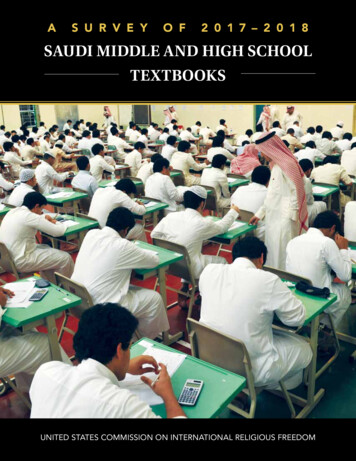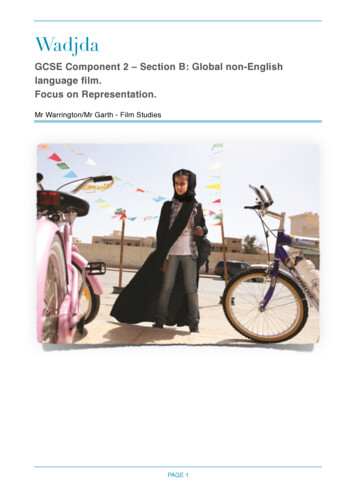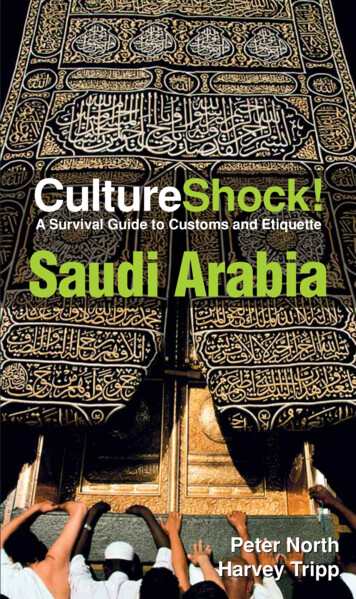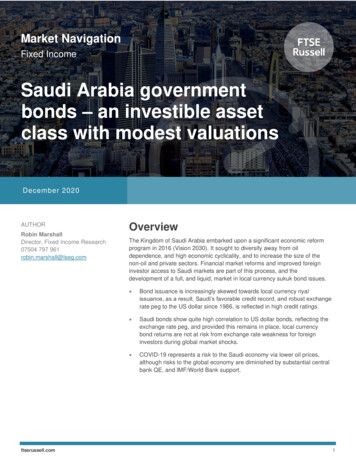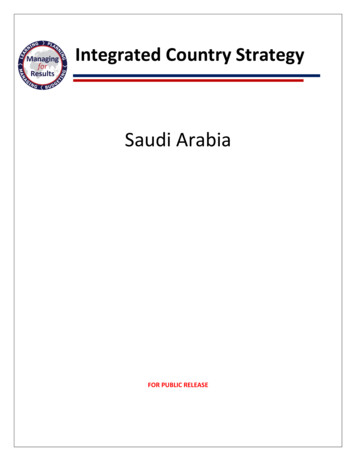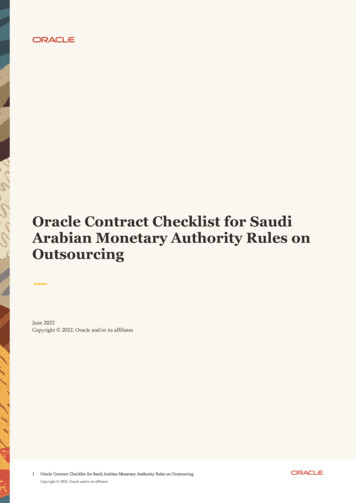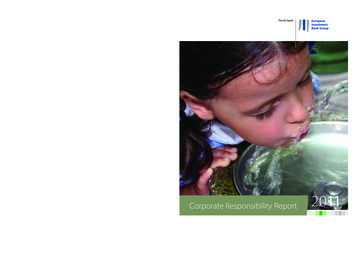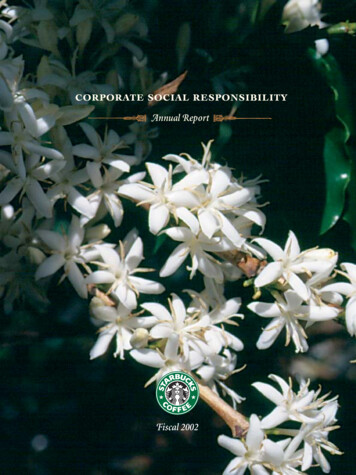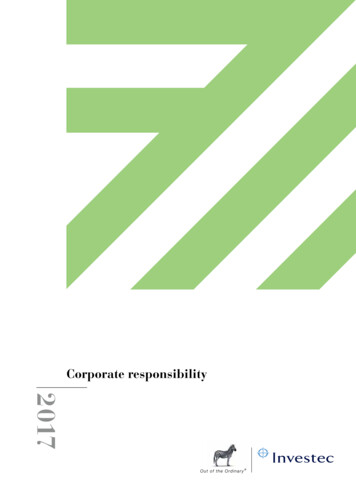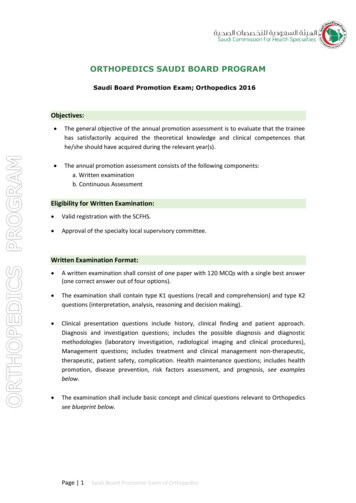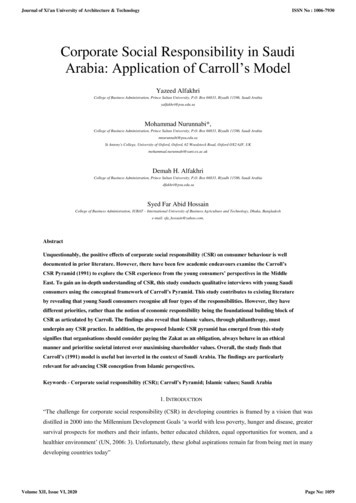
Transcription
Journal of Xi'an University of Architecture & TechnologyISSN No : 1006-7930Corporate Social Responsibility in SaudiArabia: Application of Carroll’s ModelYazeed AlfakhriCollege of Business Administration, Prince Sultan University, P.O. Box 66833, Riyadh 11586, Saudi Arabiayalfakhri@psu.edu.saMohammad Nurunnabi*,College of Business Administration, Prince Sultan University, P.O. Box 66833, Riyadh 11586, Saudi Arabiamnurunnabi@psu.edu.saSt Antony's College, University of Oxford, Oxford, 62 Woodstock Road, Oxford OX2 6JF, UKmohammad.nurunnabi@sant.ox.ac.ukDemah H. AlfakhriCollege of Business Administration, Prince Sultan University, P.O. Box 66833, Riyadh 11586, Saudi Arabiadfakhri@psu.edu.saSyed Far Abid HossainCollege of Business Administration, IUBAT – International University of Business Agriculture and Technology, Dhaka, Bangladeshe-mail: sfa hossain@yahoo.com,AbstractUnquestionably, the positive effects of corporate social responsibility (CSR) on consumer behaviour is welldocumented in prior literature. However, there have been few academic endeavours examine the Carroll’sCSR Pyramid (1991) to explore the CSR experience from the young consumers’ perspectives in the MiddleEast. To gain an in-depth understanding of CSR, this study conducts qualitative interviews with young Saudiconsumers using the conceptual framework of Carroll’s Pyramid. This study contributes to existing literatureby revealing that young Saudi consumers recognise all four types of the responsibilities. However, they havedifferent priorities, rather than the notion of economic responsibility being the foundational building block ofCSR as articulated by Carroll. The findings also reveal that Islamic values, through philanthropy, mustunderpin any CSR practice. In addition, the proposed Islamic CSR pyramid has emerged from this studysignifies that organisations should consider paying the Zakat as an obligation, always behave in an ethicalmanner and prioritise societal interest over maximising shareholder values. Overall, the study finds thatCarroll’s (1991) model is useful but inverted in the context of Saudi Arabia. The findings are particularlyrelevant for advancing CSR conception from Islamic perspectives.Keywords - Corporate social responsibility (CSR); Carroll’s Pyramid; Islamic values; Saudi Arabia1. INTRODUCTION“The challenge for corporate social responsibility (CSR) in developing countries is framed by a vision that wasdistilled in 2000 into the Millennium Development Goals ‘a world with less poverty, hunger and disease, greatersurvival prospects for mothers and their infants, better educated children, equal opportunities for women, and ahealthier environment’ (UN, 2006: 3). Unfortunately, these global aspirations remain far from being met in manydeveloping countries today”Volume XII, Issue VI, 2020Page No: 1059
Journal of Xi'an University of Architecture & TechnologyISSN No : 1006-7930The Kingdom of Saudi Arabia (KSA) referred to as ‘Saudi Arabia’ in this article] is located in the far south-westof Asia and bordered by Jordan, and Iraq on the north and northeast, Kuwait, Qatar and the United Arab Emirateson the east, Oman on the southeast, and Yemen on the south (see Fig. 1). According to General Authority forStatistics (2017), the total population of Saudi Arabia is 31.7m (as at 2016) and the youth segment (15–24 years)stands at around 4.79m of the total population. The two holiest places for Muslims are the Holy Mosque in Meccaand the Prophet Mosque in Madinah, both of which are located in Saudi Arabia.According to Saudi Arabian Cultural Mission (2018), “Saudi Arabia is a founding member of Gulf CooperationCouncil (GCC), United Nations, League of Arab States, Organization of the Islamic Conference (OIC), andOrganization of Petroleum Exporting Countries (OPEC); member of many international organizations, includingthe World Bank, the International Monetary Fund, and the World Trade Organization (WTO); and signatory ofthe Nuclear Non-Proliferation Treaty”. The culture of Saudi Arabia is defined by its Islamic heritage, its historicalrole as an ancient trade centre, and its Bedouin traditions (Saudi Arabian Cultural Mission, 2018).Figure 1. Map of Saudi Arabia (Source: https://legacy.lib.utexas.edu)2. LITERATURE REVIEW AND THEORYAlthough corporate social responsibility is not an undiscovered phenomenon, it has not been investigatedequally all over the world. Previous studies focused on the role of developed countries like the USA, Europe,and Australia to implement corporate social responsibility (Hofman, Moon, & Wu, 2015). The way to dealwith CSR varied globally and also depends on situational factors such as profit margin of the organization,Volume XII, Issue VI, 2020Page No: 1060
Journal of Xi'an University of Architecture & TechnologyISSN No : 1006-7930the role of institutional investors and so on (Dyck, Lins, Roth, & Wagner, 2019). Recent studies investigatedthe role of multinational enterprises (MNEs) who spend a significant amount in corporate socialresponsibility (Asmussen & Fosfuri, 2019), the role of stakeholders in corporate social responsibility(Aguinis & Glavas, 2017), role of social networking and media entrepreneurship (Hossain, 2019), peer effectof CSR (Cao, Liang, & Zhan, 2019) and sustainable development (Astrakhantseva, 2019). Cause marketing,cause-related marketing or corporate social marketing (Shashidhar, Murugaiah, & Gonchkar, 2019) can bethe way of sustainable development as discovered by the researchers recently. These all are part of corporatesocial responsibility includes providing fund, volunteering or even raising awareness for a social issue.The role of the government to promote corporate social responsibility from the EU perspective has beendiscovered and revealed the importance and effectiveness of government in boosting CSR (Whitford &Provost, 2018). As stated earlier, more and more research on CSR has been conducted in developed nationsin various aspects, however, the scenario is still under the shadow in the Asian region. Many countries in theAsian region are known as Muslim countries and they have specific Islamic principle which is indirectly apart of corporate social responsibility. Some of these principles are investigated, however, the understandingabout the Islamic principle and CSR need deeper understanding. Islamic perspective and the role of CSR islack of investigation (Darrag & E‐Bassiouny, 2013), in spite of the empowered Muslim consumer sector.Among Asian nations, China currently catches the attention of the scholars and identified as one of the bestexamples of CSR practice among emerging economies (Fornes, Lopez, Bierens de Haan, & Blanch, 2019).On the other hand, the same has not been investigated in the Middle East Asian regions.CSR is not considered as expenditure according to a recent investigation. Rather, studies revealed that theCSR performance of the organization and financial performance are positively correlated (Cho, Chung, &Young, 2019). The total growth rate of company asset may depend on the social contribution of the company(Cho, Chung, & Young, 2019). CSR activities also can affect sustainable growth and reputation of theorganization. Another recent study revealed that CSR can maximize corporate value and help theorganization for sustainable development (Lee & Lee, 2019). So, sustainable development and CSR isclosely associated and discussed in the current literature. However, CSR experience from the youngconsumers’ perspective, especially in the Middle East region, has not been discovered yet according to ourknowledge and investigation. As the perception of CSR is always changing, it is a complex phenomenon tohandle CSR in a timely manner with the right decision in right time (Lee & Lee, 2019) to ensure sustainableorganizational development.Managers responsible for handling CSR should be responsible and committed to achieving the target of CSRadaption process as investigated in the scholarly article (Osagie, Wesselink, Blok, & Mulder, 2016).Individual competencies were highlighted in this regard for the adaption process of CSR. Based on a surveyin a Polish construction company, the researchers investigated the employee's perception about CSR practicein organization, cultural dimension and the effect, long‐term orientation and so on (Kucharska & Kowalczyk,2018). These all are influential factors in sustainable development and improved performance. As a result,the exiting literature examined CSR not only in a business perspective but also examined the individualperspective and the effect for long term development.Volume XII, Issue VI, 2020Page No: 1061
Journal of Xi'an University of Architecture & TechnologyISSN No : 1006-7930Based on the above discussion extracted from the scrutinized literature review, it is evident that the existingliterature revealed CSR in multidimensional perspective including individual and organizational viewpoint.However, Carroll’s CSR Pyramid in this context is still under the shadow. Revealing the concept of CSRwith Carroll’s CSR Pyramid in the Middle East region would fill the gap in the existing literature and helpthe managers, organizations, and decision-makers to handle CSR smoothly with a different viewpoint.Therefore, the goal of this study is to discover the Corporate Social Responsibility in Saudi Arabia with theapplication of Carroll’s CSR Model which is shown in the following sections.3. CARROLL’S CSR PYRAMID: TOTAL CORPORATE SOCIAL RESPONSIBILITY (CARROLL, 1991A)Carroll’s (Carroll, 1991) four-pyramid model provides four different responsibilities, Philanthropic, Ethical,Legal, and Economic in order to achieve best practice in CSR. Figure 1 shows the four types ofresponsibilities.Figure 1 portrays four types of responsibilities: economic responsibilities, legal responsibilities, ethicalresponsibilities, and philanthropic responsibilities (Carroll, 1991). According to Carroll (Carroll, 1991). (p.40) “ these four categories or components of CSR might be depicted as a pyramid. To be sure, all of thesekinds of responsibilities have always existed to some extent, but it has only been in recent years that ethicaland philanthropic functions have taken a significant place”. In particular, economic responsibility is thefundamental element to the CSR pyramid; the legal responsibilities come from political conditions; andfinally, ethical and philanthropic responsibilities come from societal conditions. The organisations cancontribute to the economy through making profit but need to comply with regulation, be ethical, and be goodcorporate citizen. Carroll’s CSR pyramid (Carroll, 1991). was based on an earlier study of a threedimensional conceptual model of corporate social performance (Carroll, 1979). Later, Carroll utilised thismodel in various contexts (Carroll, 1999; Carroll, 2015; Carroll, 2015; Carroll & Shabana, 2010). In recent,Carroll (Carroll, 2016) (p. 2) argues that:“This set of four responsibilities creates a foundation or infrastructure that helps to delineate in some detailand to frame or characterize the nature of businesses’ responsibilities to the society of which it is a part”.Carroll s CSR pyramid (Carroll, 1991) has been used by many studies (Abdeen, Rajah, & Gaur, 2016).However, only two studies focused on consumers’ perceptions of CSR in Islamic countries, namelyIndonesia and Malaysia (Arli & Lasmono, 2010). Arli and Lasmono (Arli & Lasmono, 2010) concludeIndonesian consumers believe that the organisations should support on CSR initiatives including social andeconomic issues. This government alone cannot solve this issue. They also find that consumers purchasefrom an organisation with good image and reputation. Arguing in a similar vein, Mohamad Yunus (2017)investigate the consumers’ purchase intentions and CSR in Malaysia. They find that Malaysian consumersconsider the economic responsibility as a fundamental element of CSR, followed by philanthropicresponsibility, ethical responsibility, and legal responsibility. In addition, they argue that organisation’sirresponsible behaviour can spread through internet and face heavy criticisms. In this case, if the organisationignores CSR could also face risk of boycotts from consumers (Abdeen, Rajah, & Gaur, 2016).Volume XII, Issue VI, 2020Page No: 1062
Journal of Xi'an University of Architecture & TechnologyISSN No : 1006-7930Most of the studies on consumers’ perceptions on CSR are predominantly based on quantitative surveyresearch which fails to provide a rich understanding of the issue (Abdeen, Rajah, & Gaur, 2016). As theresult, to achieve the aims of the study, we adopted the interpretive paradigm – qualitative interviews whichis discussed in detail in the next section.Figure 2. Carroll’s Total Corporate Social Responsibility Pyramid (Carroll, 1991, p. 42) [7].Volume XII, Issue VI, 2020Page No: 1063
Journal of Xi'an University of Architecture & TechnologyISSN No : 1006-7930Fig. 3 CSR pyramid for developing countries 4894. METHODSThe study utilized mixed methods: survey and interviews. The surveys were conductedThis study has adopted an interpretivist approach –qualitative interviews. This approach offers a richunderstanding of the issues (e.g. this study focuses on the meaning of social phenomena rather thanmeasurement (Collis & Hussey, 2014). The data was collected through in-depth semi-structured interviewqualitative research. This method was deemed most appropriate to explore themes and identify issues thatwould remain hidden (De Ruyter & Scholl, 1998). The study also used non-probability technique ofsampling.The respondents were selected from two major provinces in Saudi Arabia: a) Riyadh and b) Tabouk (seeFigure 1). The red symbol of Figure 1 indicates the study location of two provinces. Riyadh is the capital ofSaudi Arabia, having 15 municipal districts and more than 6 million people. According to the Ministry ofInterior (Ministry of Interior, 2014), the population of Riyadh is composed of Saudi families with 65% andnon-Saudi families and employment with 35%. The increase of the economic capabilities of Riyadh cityincluding: large population growth, and employment opportunities growth. On the other hand, Tabuk, is thecapital city of the Tabuk Region (northwestern) with population of 0.79 million. Geographically, it is closeto the Jordan–Saudi Arabia border.Three main conditions were set before conducting any interview: age group and nationality. It means thatthe age group should between 18-26, and the participants should be Saudi National. Finally, the participantsare regular customer (purchase products frequently, i.e. at least once a month). Table 1 presents the overviewof the 34 interviewees of the study. According to [33] (p. 429) “ qualitative sample sizes of ten may beadequate for sampling among a homogenous population Others state that qualitative sample sizes of 2030 are typically conducted by researchers to establish data saturation using a grounded theory approach toqualitative inquiry . However, no evidence is presented as the basis for this latter sample size claim”. Table1 shows that the highest number of participants were between the age group of 18-20 (15 interviewees). TheVolume XII, Issue VI, 2020Page No: 1064
Journal of Xi'an University of Architecture & TechnologyISSN No : 1006-7930other age groups were: 21-23 (9 interviewees), and 24-26 (10 interviewees). In terms of gender, 21participants were male and 13 were females. The majority (8 of 13) were students. Overall, 20 of 34participants were students. Each participant was interviewed separately. The female participant wasinterviewed by the female researcher of the study. This is because the male researcher could not conduct thefemale participants due to the cultural customs of Saudi Arabia. The interview was conducted in Arabic andthen transcribed into English. Each interviewee was coded as I1 . I34. The data were analysed followingfour steps: transcription of interview, developing codes, developing categories, and drawing conclusion. Theinterviews were analysed through NVivo 10 qualitative data analysis software. Al responses werecategorised into themes according to Carroll Pyramid. Two researchers of the study read twice thetranscriptions in order to find out any discrepancy in translation. However, no such issues were found.Table 1. Interviewees’ I12MaleStudent18-20I13FemaleFinancial risk analyst21-23I14FemaleInvestment banking 24-26I17FemaleStudent18-20I18FemaleLegal I21MaleRetailer (Branch manager)24-26I22MaleLegal officer24-26I23MaleComputer specialist24-26I24MaleCar Dealer24-26I25MaleTreasurer24-26Volume XII, Issue VI, 2020Page No: 1065
Journal of Xi'an University of Architecture & TechnologyISSN No : leProduct development specialist24-26I27MaleData entry mer service emaleStudent18-20Note: I Interviewee; I1 Interviewee No.1.5. RESULTS AND DISCUSSION5.1. New Definitions of CSRAs indicated in introduction, there are many definitions of CSR, and indeed no universally agreed definition.From the interviews, it is found that the majority of participants (25 participants) consider CSR a voluntaryinitiatives of organisations whilst 9 participants consider it as a mandatory initiative. According to theinterviewees, the government should play a major role in developing the role of the organisations regarding CSRin Saudi Arabia.Table 2 presents the views of the participants regarding the definitions of CSR. It is observed from Table 2,the majority of the interviewees argue that the organisations should be more responsible in the form of givingback to society (e.g., donations). The interviewees also stress that companies use various forms of CSR initiativesincluding creating new jobs and protecting the environment. The results also show that job creation is seen as oneof the important responsibility. This is mainly because the majority participants are young in this study, and theyrecognise that the unemployment rate in Saudi Arabia is high, and hence they consider to reduce it (Reinman,2010).Volume XII, Issue VI, 2020Page No: 1066
Journal of Xi'an University of Architecture & TechnologyISSN No : 1006-7930Table 2. CSR Definitions from Participants.IntervieweesI2I7I18I15I28I26CSR DefinitionI think CSR means creating jobs, donations, caring about environment. The CSR alsoincludes caring about employees and customers.The CSR is the responsibility for the community. This responsibility can be in the formof donating money or moral supportI believe that the CSR should be the balance between profitability of the company andsocially responsibleI do strongly believe that CSR means the giving back (e.g. donations) to the societyI feel the CSR is more about positive image building of the company. This means thatthe company wants to present them to the public that they are very responsible to the societyThe CSR is a broad idea. I believe the CSR is the connection or communication betweenthe company and the society. I also strongly believe that the CSR should be the norms orvalues to each company. In our society, some companies are certainly taking many initiatives.I have heard the term ‘CSR’ in one of my courses last year. But unfortunately I forgotthe real meaning of it.I23I feel the company has a bigger role in developing our Saudi society. In this regard, thecompanies need to be more participative, cooperative, and responsive.I34As you know there are many companies doing great job in addressing the CSR in SaudiArabia. In my opinion, CSR is the responsibility to the society and protecting theenvironment. The CSR is to create more jobs in order to reduce the unemployment in ourcountry.By analysing the comments from all 34 interviews, CSR can be defined as “All initiatives that a companyconsider has a positive impact on employees, shareholders, society and the environment”.I215.2. Awareness of CSRThe interviewees were asked about the awareness level of CSR among young consumers in Saudi Arabia.The majority interviewees agreed that there is a low level awareness of the current CSR. The nine intervieweesonly believe that there is moderate level of awareness exist among young Saudi consumers. This is because youngconsumers are very active in social media and very responsive to the irresponsible behaviour of any organisation.These interviewees also mention that CSR concept is sometimes limited to ecology and environment. Accordingto these participants, four primary sources of CSR information: social media, family, education, and workexperience. One interviewee in particular demonstrate that “ .as a medical professional, it is one of our valuesand responsibilities to be socially responsible, because we will be dealing with a lot of people which is part ofsociety” [I20]. Another interviewee [I5] were aware about the concept from a business course in an internationalschool in Riyadh. He also mentions that international schools teach CSR but the local schools do not include anysubjects on CSR.5.3. Views on Carroll’s Pyramid in Saudi Arabia5.3.1. Economic ResponsibilityAccording to CSR Pyramid, economic responsibility is the first pillar of responsibility. Carroll (Carroll,1991) therefore argues that profit is fundamentally important motive for any organisation and the socialresponsibility comes second. One interviewee put it in the following way:“Well, I believe that organisations should strongly feel about their responsibility to the economy; As part ofthis, they may strategically introduce some projects to be beneficial to the economy and society they operate in”.[I5]Volume XII, Issue VI, 2020Page No: 1067
Journal of Xi'an University of Architecture & TechnologyISSN No : 1006-7930Similarly, another interviewee agrees with Carroll’s argument saying that:“The societal issue should be secondary. At first, the organisations need to focus on making profit becausethey will be unable to contribute to society without profit”. [I29]“Organisations should support society and play a part in developing the country, especially the big companiesthat have huge budgets”. [I16]However, several interviewees consider risky strategy of making profit only. The organisations may becomemore selfish and will care themselves only. These interviewees also emphasise that large organisations shouldmore contribute regarding the country’s economic standing, create jobs, and support local communities.Interestingly, some interviewees mention that company may fulfil economic obligation by creating more jobs.Two interviewee stated that:“In Saudi Arabia, we import lots of products from outside. If we produce some of the products companiesmay create new jobs which will be beneficial to our economy”. [I4]“Organisations should focus on reducing uprising unemployment rate. Profit is not the only parameter ofsuccess in today’s world”. [I33]5.3.2. Legal ResponsibilityThis is the second element of Carroll s CSR pyramid. The interviewees argue that there is no CSR relatedregulation in Saudi Arabia. As a result, many organisations do not bother to apply it. The interviewees also callfor a CSR regulation in near future. The following interviewees stated that:“I believe that the government must enact CSR regulations to protect the rights of employees and society”.[I8]“The government should develop policy to manage the CSR activities and to force company to do so”. [I19]Some participants also believe that the government should enforced the CSR regulation with the view ofcreating a support to the society. Interestingly, there were some disagreements amongst the interviewees: someparticipants agreed to make CSR regulations whilst others disagreed because they believe CSR is an optionalstrategy. The interviewees also perceive that paying the Zakat is an Islamic obligation and essential component.Organisation should have the right to choose whether they want to do more in term of CSR initiatives or not. Thiscould be done through self-willingness rather introducing new regulation.5.3.3. Ethical ResponsibilityEthical responsibility is the third element of Carroll s CSR pyramid. The majority of the interviewees rankedethical responsibility is second most important element in CSR pyramid. The participants viewed that Islamicvalues and ethics are one of the core components in Islam. Two interviewees said:“From Islamic point of view, ethics is one of the most important elements that any company must follow.What does Islam teach us? Off course we need to be ethical to the society”. [I19]“As a Muslim, we fear of God. Hence, the organisations should operate business in an ethical manner”. [I25]Saeed et al. (Saeed, Ahmed, & Mukhtar, 2001) argue that profit motives or profit maximisation is not basedon Islamic values. Islamic values create a link between profit and societal benefit. The findings of the study aresimilar to the view of Miller and Deiss (Miller & Deiss, 1996) who argue that organisations need to develop anethical corporate culture.Indeed, the participants also stated that organisations should be fair and transparent to its all stakeholders.Some interviewees demonstrate the organisations should avoid unethical behaviour including political benefits,increase prices, and discrimination. These finding of the study are similar to the two studies (Siwar & Hossain,2009). Siwar and Hossain (Siwar & Hossain, 2009) strongly suggest that orgamisations should avoid any form ofdiscrimination. Specificaaly, Almoharby (Almoharby, 2011) claims that all people are equal regardless of theircolour, race, gender, and characteristics. As a result, the Islamic background of participants affects their perceptiontoward corporate responsibility especially in terms of ethical responsibility.5.3.4. Philanthropy ResponsibilityAccording to Carroll’s CSR pyramid, philanthropy responsibility is the fourth element. The philanthropyfrom an Islamic point of view is quite different. According to the participants, Islamic philanthropy is one of theimperative constituent of Muslim obligations. Two forms of philanthropy in Islam: Zakat and Sadaqa. Zakat is anIslamic obligation. As prescribed in the Quran, all Muslims individuals and organisations should pay 2.5% of theVolume XII, Issue VI, 2020Page No: 1068
Journal of Xi'an University of Architecture & TechnologyISSN No : 1006-7930profit once a year to people in need. The organisations could do more donations through Sadaqa (i.e. voluntarydonation). The findings are in consistent with Almoharby (Almoharby, 2011) who argues that CSR in Islamdenotes as a religious and moral obligation.Importantly, the interviewees mention that the organisations should donate privately which is the keyelements of philanthropy in Islam. In other words, Muslims should not publicise the donation because the recipientmay feel embarrassment. Nevertheless, the participants mention that some companies are donating with the realintention to media coverage and publicity. Accordingly, the real intention of donation is also important parameterof CSR activities from Islamic perspective. The findings also suggest that publicity intention could lead tohypocrisy which is prohibited in Islam.Most of the participants (30 out of 34) strongly believe that the organisations should consider CSR activitiesas an investment from the Islamic point of view. By doing so, the organisations will receive the reward from theGod. The findings reveal that the interviewees with Islamic background perceive the CSR almost in every aspect.This view is supported by (Siwar & Hossain, 2009) (p. 290) who argues “Islam is not only a religion, but is alsoa guideline for the complete way of life”. Accordingly, business ethics cannot be separated from ethics in theother aspects of a Muslim’s daily life (Almoharby, 2011).5.4. Proposed Islamic CSR Model [Revised Carroll’s CSR Pyramid]Based on the findings of the study, it can be argued that Carroll s CSR pyramid (Carroll, 1991) is supportedin Saudi Arabia. However, participants have different views in terms of the order of four responsibilities of CSRpyramid. Accordingly, we propose a modified CSR pyramid from an Islamic perspective (please see Figure 3).The participants do not consider the economical responsibility as the fundamental building block of CSR.According to the participants, Islamic values as a fundamental building block underpins the CSR decisions oforganisations. Therefore, under the Islamic philanthropy organisations that practice CSR must pay the Zakat. Asmentioned earlier that Zakat is the mandatory Islamic obligation and is the minimum practice of CSR. Themajority participants believe that ethical responsibility should be the second block of CSR pyramid. Theorganisations need to apply Islamic values and behave in an ethical and responsible manner to the society.According to the participants, legal responsibility should be the third and economic responsibility as the fourthrespectively. Based on the Islamic CSR pyramid, the economic responsibility positioned at the top of the pyramidonly after three elements. The results also do not support Friedman’s (Friedman, 1970) argument who argue thatthe major objective of the organisation is to maximise shareholder’s values. To sum up, the results of the studydemonstrates that the CSR pyramid is converted upside down from Islamic crespon
According to Saudi Arabian Cultural Mission (2018), "Saudi Arabia is a founding member of Gulf Cooperation Council (GCC), United Nations, League of Arab States, Organization of the Islamic Conference (OIC), and Organization of Petroleum Exporting Countries (OPEC); member of many international organizations, including
